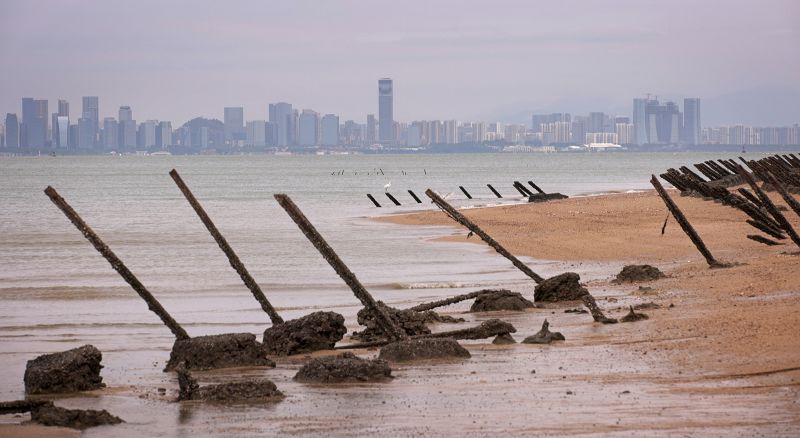China is increasing patrols in waters near a group of frontline islands controlled by Taiwan, as tensions rise after two Chinese fishermen drowned during a pursuit by Taiwan’s coast guard who accused them of trespassing.
China’s coast guard said Sunday its Fujian division will strengthen maritime law enforcement and carry out “regular patrols” in waters around the Chinese city of Xiamen and Taiwan’s Kinmen islands, which lie just miles apart.
The move is aimed at “further maintaining the order of operations in the relevant waters and protecting the lives and property of fishermen,” Gan Yu, a spokesperson for China’s coast guard, said in a statement.
The patrols are likely to put Chinese coast guard vessels in closer proximity to their Taiwanese counterparts, potentially raising the risk of miscalculation and conflict.
The escalation came days after a Chinese speedboat capsized while attempting to flee from Taiwan’s coast guard, which said it had trespassed to fish in waters about 1 nautical mile off Kinmen’s coast.
Four crew members fell into the water. Two survived after being rescued by Taiwan’s coast guard, while the other two were found unconscious and confirmed dead after being taken to the hospital in Kinmen.
Beijing has issued strongly-worded condemnations and blamed Taiwan’s ruling Democratic Progressive Party (DPP) for the deaths, claiming it had used “various excuses to forcefully seize mainland fishing boats and treat mainland fishermen roughly and dangerously.”
“Such a vicious incident seriously hurt the feelings of compatriots on both sides of the Taiwan Strait” during the Lunar New Year holiday – a time for family reunions celebrated in both mainland China and Taiwan, China’s Taiwan Affairs Office said on Thursday.
The Chinese Communist Party regards Taiwan, a self-governing democracy, as part of its territory, despite never having controlled it, and Chinese vessels are frequently active in the waters near Kinmen due to its geographical proximity to mainland China.
Taiwan authorities on Thursday expressed regret over the deaths, but maintained that its coast guard officers were acting on their mandates in accordance with the law.
On Saturday, China’s Taiwan Affairs Office ramped up the rhetoric, saying the deaths had caused “strong indignation” in mainland China while denying Taiwan’s designation of “restricted” waters near Kinmen.
“Fishermen on both sides of the Taiwan Strait have been operating in traditional fishing grounds in the Xiamen-Kinmen waters since ancient times, and there is no such thing as ‘prohibited or restricted waters,’” it said in a statement.
The office also urged Taiwan authorities to release the two surviving fishermen from custody.
In a rebuttal, Taiwan’s Mainland Affairs Council said Sunday it will continue to enforce the law in waters it controls and expel or detain trespassing vessels.
It also denied Beijing’s accusations of “rough expulsions,” saying the unfortunate incident happened due to “constant intrusions” by ships that carry no name, have no certification or port registration, and the refusal to cooperate by crew members who made a dangerous move to flee.
The case is being investigated by prosecutors in Taiwan, the council added.
Kuan Bi-ling, Taiwan’s Minister of Ocean Affairs Council, said the two surviving fishermen under Taiwan’s custody were “being taken care of” and would “be repatriated soon as the case progresses.”
Kuan added that Taiwan’s coast guard had previously rescued mainland Chinese fishermen and cargo ships despite rising military and political tensions across the Taiwan Strait in recent years.
Over the past three years, 20 people from mainland China have been rescued by Taiwan’s coast guard, according to Kuan.
China has increased economic, military and diplomatic pressure on Taiwan and cut off most communications with Taipei since the DPP came to power in 2016.
In the preceding years, during the Beijing-friendly Kuomintang government’s term, rescue teams from Taiwan and mainland China had held joint maritime drills to practice search and rescue operations in a sign of warming ties.
